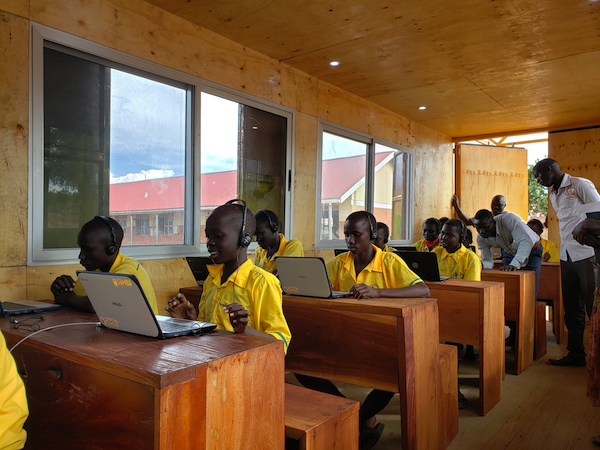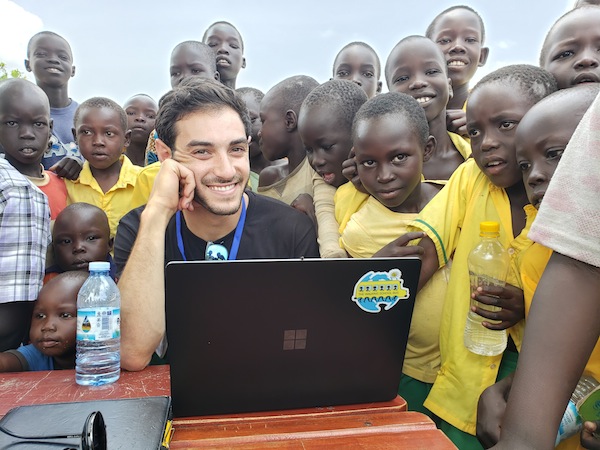Students in Uganda at work in a BrightBox, a solar-powered classroom. (photo from Simbi Foundation)
This year’s graduating class at Vancouver Talmud Torah made a significant impact to the lives of thousands of refugees in the Bidibidi refugee settlement in Uganda. Their connection to the refugees on the African continent is a story that goes back to two young Jewish men who grew up in Vancouver and are determined to enhance education and create lifelong change in the lives of displaced people.
As co-founders of the Simbi Foundation, Ran Sommer and Aaron Friedland have established a template for BrightBoxes, which are sustainable solar-powered classrooms that are shipped to refugee settlements in Uganda and other countries. Each box costs $55,000 Cdn and includes a shipping container with solar panels, laptops, projectors and digital aids, as well as all the installation costs at its destination.
The foundation has installed five BrightBoxes in the Bidibidi settlement, where 240,000 refugees reside, and one in the Palorinya settlement, where there are 170,000 refugees. Each week, a BrightBox serves 6,000 learners.
“We’re able to reach that many learners because we connect the solar energy from the BrightBox to other classrooms in the area. They all become connected by the electricity and wi-fi generated by the BrightBox, which means the entire school population is connected simultaneously. The power of this 40-foot shipping container is its ability to connect the surrounding school blocks,” Sommer explained.
Back at VTT, the school established the Grade 7 Mitzvah of Valuing Philanthropy program in 2008. Each year, the graduating class chooses charities or causes that are meaningful to the group and fundraises to support those causes. This year, the school decided to fundraise exclusively for the Simbi Foundation.
“After learning about the power of a BrightBox to dramatically transform lives in the Bidibidi refugee camp in Uganda, we decided to go bold and big by dedicating all money raised to this one cause only,” said Jennifer Shecter, director of communications and admissions at VTT. “We wanted to make a giant impact this one time.”
The Grade 7 class dedicates several months of study and exploration to the MVP program and Shecter said the students become emotionally invested and feel genuine pride in their fundraising efforts. “In years past, students ran bake sales, garage sales, babysitting services, movie screenings at VTT and other initiatives to boost their MVP contributions,” she said. “This year, all those options were not available due to COVID so several of our students passionately worked the phones (or texted) family members and friends to donate.”
Several students contributed in excess of $1,000 each to the program, with the average donation ranging between $180 and $250 per student. A total of $38,000 was raised.
Shecter said the students’ connection to Friedland and Sommer, and their understanding of the scope of this project, enabled them to convince others to jump on board and donate to the cause.
The two co-founders spent time in the classroom with the Grade 7 students, explaining the purpose of the BrightBoxes and the extent of the research that motivates the Simbi Foundation’s decisions. The students were assigned to groups to study solar energy, the BrightBox curriculum and other topics relevant to education in the refugee settlements.
“We had two elements happening in parallel: the students were learning about our program and fundraising for it,” said Sommer. “So, they knew exactly what their fundraising efforts were contributing to. Because of that, they were able to surpass their fundraising goal. We were extremely impressed and honoured with VTT and the students’ efforts.”
Shecter added that VTT has had a relationship with Friedland for the past five years.
“VTT students meet with Aaron every year to learn about new initiatives and participate in his programs, like the Simbi reading and literacy program, and they find Aaron and Ran to be enthusiastic, approachable and relatable,” she said. “Our students thoroughly enjoyed each interaction with them and felt a sense of pride knowing members of their community are creating avenues for real change for individuals with many barriers to education and prosperity.”
Lauren Kramer, an award-winning writer and editor, lives in Richmond. To read her work online, visit laurenkramer.net.


